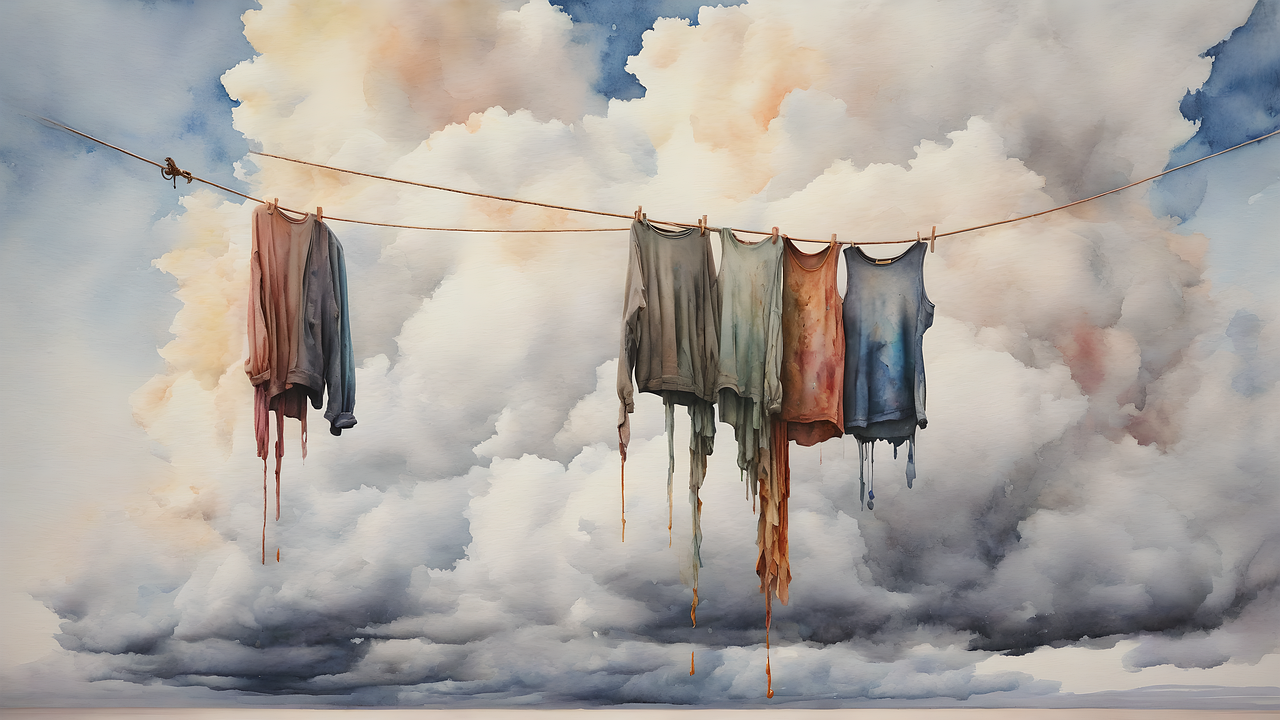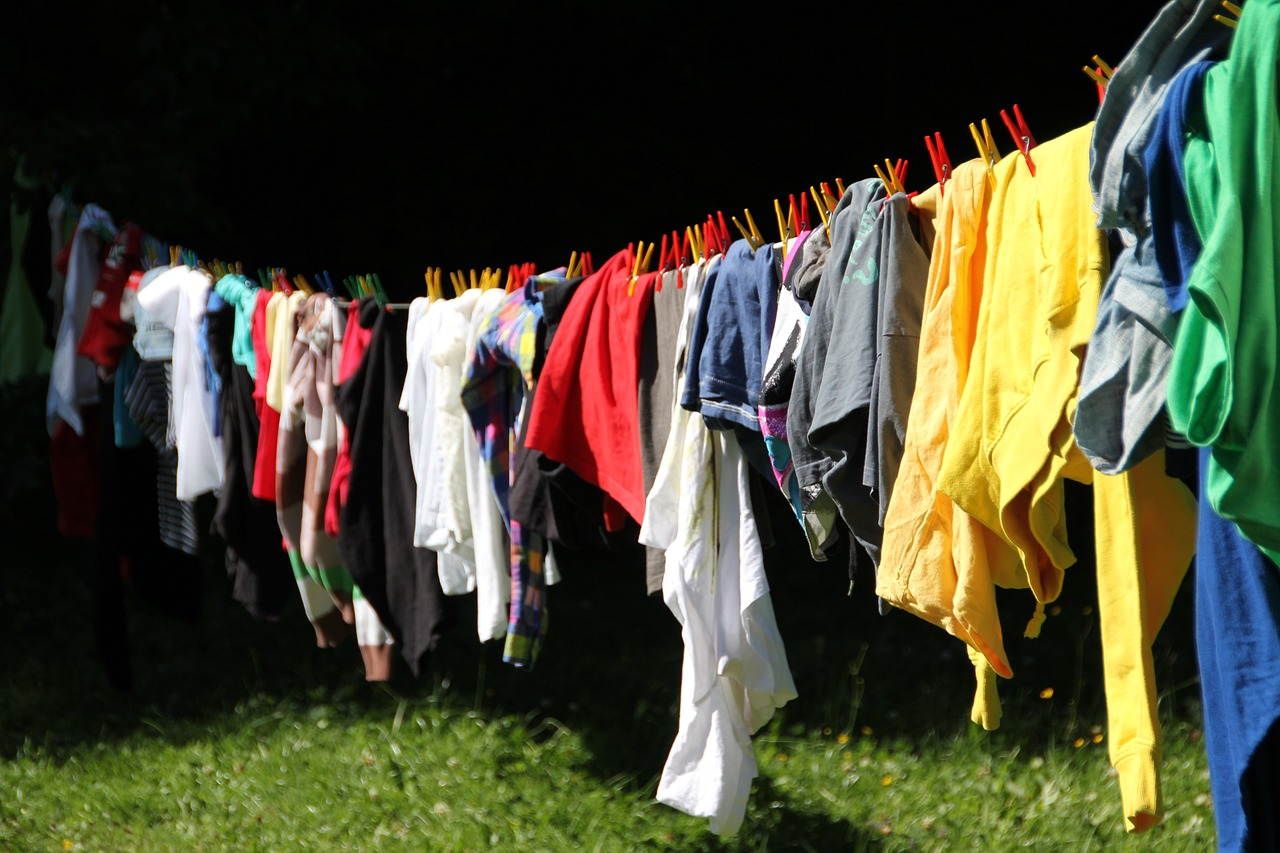
Clothes laid out

When Leila washed, she filled all the ropes made of wire surrounding her house with pants, shirts, dresses and sheets that looked like multicolored parrots when they moved in the wind. Leila and her house were hidden between fabric walls that smelled of lavender and azulillo, a kind of soap that “made the white whiter,” or so they said on TV.
At that time I was going to school and there we were informed that the war had begun. The government military had passed through town warning people not to leave their homes because there were many rebels and the police were looking for them:
"You should only go out to work or to school. And if you see anything or anyone strange, let us know immediately. Those who hide the insurgents will also be judged as traitors to the homeland,” they said in the town square, in a loud voice.

"Good thing we are far away",_ my mom would say as she knitted and dad would nod his head.
The days passed normally and Leila, who was a kind woman, very nice, kept going through the two streets of the village looking for people's dirty clothes. Sometimes people had no way to pay her and even so, Leila would take the clothes:
"Don't worry, woman, if you don't pay, God pays me with a job in heaven",_ Leila told my mom several times and she would take out all the dirty sheets and table linens and give them to her in a plastic bag. Then Leila would write my family's name on the outside of the bag, with a red marker, fine tip: Lopez Aranda, which was us.

"Shall I go get the clean clothes?" -And I was just waiting for her to say yes before running to Leila's house, who, as if she saw me through the window, would come out and wait for me at the door of the house with the bag that had my last name on it. I would take the bag, thank her and give her whatever mom had sent her, a chicken, grains or freshly milked milk, and return home. On the way, I would open the bag and stick my nose in to smell the scent of lavender and clean: that was a childish vice.
Everything was fine until the threat and the chase became unstoppable: like a poison ivy covering everything. One day, while I was doing my homework, we saw the government military burst into the village. With their guns they knocked on the doors of the houses and asked many questions. They were looking for some rebels who were hiding. Nobody knew anything and they even tried to take some men away, but the people were fiercely opposed. The only known name they pronounced was Leila and according to them, they had gone to her house and found no one.

My mom said that Leila did that because she had a good heart and was looking for a place in heaven; dad disagreed. As for me, in my little world, I was just sad that I would never smell the scent of lavender on the sheets again, that fresh, clean feeling that I loved so much.

All images are free of charge and the text is my own, translated in Deepl


Thank you for reading and commenting. Until a future reading, friends
![Click here to read in spanish]
Ropas tendidas
En aquellos tiempos, yo era uno de los que apreciaba el olor a lavanda que salía de la ropa recién lavada que Leila tendía al sol. Eran montones de ropa que Leila lavaba de vez en cuando, porque era la única que tenía lavadora en el pueblo y la gente, alquilaba sus servicios de lavandera y le pagaba con maíz, cochino, gallinas, y Leila encantada de lavar montones y montones de ropa sucia.
Cuando Leila lavaba, llenaba todas las cuerdas hechas de alambre que rodeaban su casa, con pantalones, camisas, vestidos y sábanas que parecían papagayos multicolores cuando se movían con el viento. Leila y su casa quedaban ocultas entre paredes de tela con olor a lavanda y azulillo, una especie de jabón que “dejaba el blanco más blanco”, o eso era lo que decían en la televisión.
En esa época yo iba a la escuela y ahí nos informaron que había comenzado la guerra. Los militares del gobierno habían pasado por el pueblo advirtiendo que no salieran de sus casas porque había muchos rebeldes y la policía los estaba buscando:
_Solo deben salir a trabajar o a la escuela. Y si ven algo o alguien extraño, nos avisan inmediatamente. Los que escondan a los insurgentes, también serán juzgados como traidores a la patria –dijeron en la plaza del pueblo, con voz fuerte.
Como era poco lo que podíamos hacer, porque también nos habían prohibido reunirnos en las casas o públicamente, cada familia se sentaba frente al televisor a ver las noticias sobre la guerra y a agradecer que como éramos un pueblo, estábamos lejos de los tentáculos del poder y el enfrentamiento:
_Menos mal que estamos bien lejos –decía mi mamá mientras tejía y papá asentía con la cabeza.
Los días transcurrían con normalidad y Leila, que era una mujer bonachona, muy simpática, seguía pasando por las dos calles del pueblo buscando la ropa sucia de la gente. A veces la gente no tenía cómo pagarle y aun así, Leila se llevaba la ropa:
_No te preocupes, mujer, si no pagas tú, me lo paga Dios con un puestico en el cielo –le dijo Leila varias veces a mi mamá y ella sacaba todas las sábanas sucias y la mantelería, y se las entregaba en una bolsa de plástico. Luego, Leila anotaba el nombre de mi familia en la parte de afuera de la bolsa, con un marcador rojo, punta fina: López Aranda, que éramos nosotros.
Yo era el encargado de ir a buscar la ropa cuando ya estaba lista. Todo el pueblo sabía, que solo podíamos buscar la ropa cuando viéramos las cuerdas vacías. De acuerdo a la cantidad de ropa lavada, a veces las prendas podían durar dos o tres días al sol y si yo llovía, entonces podían ser cinco y hasta seis días. Cuando yo veía las cuerdas desnudas, le preguntaba a mi mamá:
_¿Voy a buscar la ropa limpia? –y solo esperaba la afirmación para salir corriendo a casa de Leila que como si me viera por la ventana, salía a esperarme a la puerta de la casa con la bolsa que tenía mi apellido. Yo tomaba la bolsa, le daba las gracias y lo que mamá le hubiese mandado, una gallina, granos o leche recién ordeñada, y me devolvía a casa. En el camino, abría la bolsa y metía la nariz para oler la esencia de lavanda y limpio: aquel era un vicio infantil.
Todo estaba bien hasta que la amenaza y la persecución se hicieron imparables: como una yedra venenosa que lo cubre todo. Un día, mientras hacía la tarea, vimos cómo los militares del gobierno irrumpieron en el pueblo. Con sus armas golpearon las puertas de las casas e hicieron muchas preguntas. Buscaban a unos rebeldes que estaban escondidos. Nadie sabía nada e incluso intentaron llevarse a algunos hombres, pero el pueblo se opuso ferozmente. El único nombre conocido que ellos pronunciaban era Leila y según ellos, habían ido a su casa y no habían encontrado a nadie.
Solo después, cuando nos sentamos frente al televisor a ver las noticias, nos enteramos de todo: la casa de Leila era la guarida de los rebeldes y las ropas tendidas era la forma de impedir que los vecinos vieran quién llegaba y salía de la casa.
Mi mamá dijo que Leila hacía aquello porque tenía buen corazón y buscaba un lugar en el cielo; en cambio papá estuvo en desacuerdo. Por mi parte, en mi pequeño mundo, yo solo estaba triste porque más nunca olería la esencia de lavanda en las sábanas, esa sensación de frescura y limpio que me encantaba tanto.